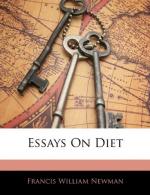|
This section contains 3,443 words (approx. 12 pages at 300 words per page) |

|
Dictionary of Literary Biography on Francis William Newman
In the concluding chapter of his Apologia pro Vita Sua (1864), John Henry Newman contrasts the serenity he experienced upon being received into the Roman Catholic Church with the self-destructive skepticism that eventually subverts all religious truth. The contrast might well have been suggested by his brilliant younger brother, Francis William, who in his own spiritual autobiography, Phases of Faith; or, Passages from the History of My Creed (1850), had recounted his painful journey from unconditional faith to complete rejection of the fundamental tenets of "Christianity." Unlike the elder Newman, Francis regarded distrust of authority as inseparably related to the pursuit of truth. Accordingly he became, in his own words, "anti-everything," adamantly opposed to "things as they are." His "sharp-cutting, restlessly advancing intellect," as Thomas Carlyle admiringly described it in his Life of John Sterling (1851), led him to challenge received opinions in virtually every area of Victorian life and, until...
|
This section contains 3,443 words (approx. 12 pages at 300 words per page) |

|


